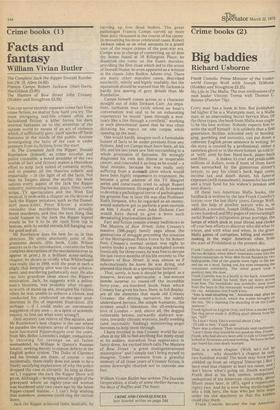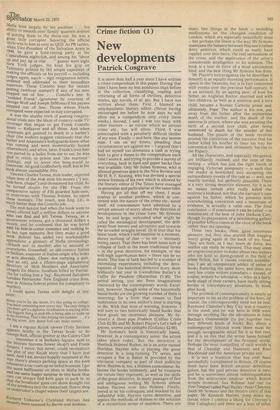Crime books (2)
Big baddies
Richard Usborne
Frank Costello. Prime Minister of the Underworld George Wolf with Joseph DiMona. (Hodden and Stoughton £3.25) My Life In The Mafia. The true confessions of a mob leader Vincent Teresa with Thomas C. Renner (Panther '75p) Every man has a book in him. But publishers bid higher if he is a Watergate man, or a Mafia man, or an absconding Secret Service Man. Of the three types, the book from Mafia man ought to be the best written. Nobody expects him to write the stuff himself : it is unlikely that a first generation Sicilian, schooled only in bootlegging, gambling and narcotics, can put down a coherent English prose sentence in writing. So the story is created by a professional, either a nameless ghost or in the more honest 'as told to' or 'with' semi by-line. Hard-back, paper-back and films . . . it makes its cool and predictable millions of dollars, even if most of them have been earmarked by the glamorous sinner's lawyer, to pay his client's back legal costs, income tax and death duties, his funeral expenses (with mausoleum), masses for his soul and a trust fund for his widow's pension and next dowry. Of these two American Mafia books, the hardback is written by the late Frank Costello's lawyer over the last thirty years, George Wolf, with the help of another lawyer who is, in addition, a novelist, Joseph DiMona. The result is two hundred and fifty pages of excruciatingly awful Reader's inDigestion prose porridge, the lumps of which stick in your throat and choke off your best efforts to discover who did what to whom, and with what and when, in the great Mafia games of corruption, killing and moneymaking in the major American cities from the start of Prohibition to the present day.
Frank Costello was still out on bail, while he appealed the tax decision, when Albert Anastasia came into the Italian restaurant on West 48th Street flanked 1,y two bodyguards. One of the guards went right to the bar and sat on a stool, facing out, his eyes sweeping the restaurant constantly. The other guard took a position near the door. Frank Costello was in a booth in the back. Anastasia leaned bver, shook his hand, then sat down across from him. The handshake was symbolic; soon word from the boys in this restaurant would sweep across the city. Anastasia was Frank's boy.
"Vito is mad-mouthing me," Anastasia said, after he had ordered a Scotch, which the waiter brought ori the run. "He's claiming I'm muscling in on the Cuba business."
Frank lighted an English Oval, and blew a smoke ring. The ring never made it, drifting apart almost from his lips. "So?"
"So I don't think Vito's worried about Cuba."
"I'll talk to him," Frank said.
There was a silence. Then Anastasia said cautiously, "I don't think that would be too good an idea, Frank." Frank, who had always been able to talk to Genovese, looked at Anastasia and said nothing. He knew he had just heard his own death warrant.
That is a • whole chapter. (Well, let's not be purists . . . why shouldn't a chapter be onlY two hundred words? The book may have been cobbled up from an original filmscript.) But I have read that chapter at least ten times, and don't know what's going on. Death warrant? Frank died in his bed, unshot, undeported, undeprived of his American citizenship, about fifteen years later, in 1973, aged a respectable eighty two. And he is now being mythologised into a folk hero, the man who put little steps under his slot machines so that the kiddies
could play them. • Frank Costello became the top American Mafia boss largely by his pacifism • . . his ability to smooth over 'family' quarrels instead of putting them to the shoot-out. He was a great little corrupter. Squaring the official circle was to him as easy as QED. As PR tactics, When Vice-President of the Salvation Army in 1949, he gave a fund-raising party at the Copacabana nightclub, and among his "show U p and pay up or else. . ." guests were eight New York judges. He kept his grip on Tammany politics by the simple expedient of making the officials on his payroll — including Judges again, natch — sign resignation letters, undated and addressed to their immediate superiors. These Costello kept for instant Posting (without stamps?) if any of his men stepped out of line . . Costello's line. It. 'rankled Frank" (grammar by courtesy of George Wolf and Joseph DiMona) if his payees stepped out of line. Those whom Frank corrupted were expected to stay corrupted.
It was the shabby trick of putting congressional trials into the blaze of country-wide TV coverage that began to get Frank Costello down — Kefauver and all those. And when Anastasia got gunned to death in a barber's chair (the authors suggest cautiously that the barber and Anastasia's bodyguards knew what was coming and were momentarily busied otherwhere), and when, later, Frank's own hair was parted by a bullet from ear to ear, he was glad to retire, to prison and "the mattress" (hiding), and to leave the boss-world to Genovese. All good Godfatherly stuff, but in his book almost unreadable. Pity.
Vincent Charles Teresa, mob leader, objected When men of the mob stole his money ("I say, look here, chaps!") and threatened his child. So he turned stoolie for the FBI. From the comparative safety of FBI-guarded hide-outs, in interviews with Thomas Renner, he taped these memoirs. The result, qua Eng. Lit., is much better than the Costello job. The mob has (or had when the book went to Press) offered half a million dollars to anyone Who can find and kill Teresa. Teresa, as a government witness, got a thousand dollars a month, and he confessed that he was bored With his hole-in-corner existence and nothing to do but tape memoirs. But they make a good book. Renner has added two workmanlike appendices: a glossary of Mafia terminology (Whack out: to murder; also to astound or overwhelm. Greaseball: an old-country Italian or Sicilian, someone of Italian origin who looks or acts slovenly. Clean: not carrying a gun. And so on), and a fifteen-page alphabetical directory of 'Mob Members and Associates' (Angelo De Marco: hoodlum killed by Patriarcha for calling him a 'fag'. Raymond Salvatore Loredao Patriarcha: New England crime boss, now in Atlanta federal prison for conspiracy to murder). I could quote Teresa with delight at any Point:
'hen you're On the street, it's like going to college. You learn something new every day. The only thing is You don't get's a diploma. Graduation is staying alive. The biggest thing in mob life is being able to wake up in the morning. That's like hitting the number. . . it's the big score. Any damn fool can make money.
I am a regular Kojak viewer (Telly Savalas appears briefly in the Teresa book: so do George Raft, official greeter at the Colony Club • . . remember it in Berkeley Square, next to the Moyses Stevens flower shop?) and Frank Sinatra. I never, but never, could reconstruct the plot of any Kojak story that I have just seen. And I am always happily surprised at the way there's always parking space at the kerb whenever a car roars up on lethal business. I get the same bafflement on plots in Mafia books, and the same happy surprise in this book that
can always find kerb gaps to park in, so Lon _at the hoodlums' guns can shoot straight out t the windows into the restaurant, flower shop or undertaker's chapel where their targets are.
Richard Usborne's Clubland Heroes has recently been reissued by Barrie and Jenkins.



































 Previous page
Previous page